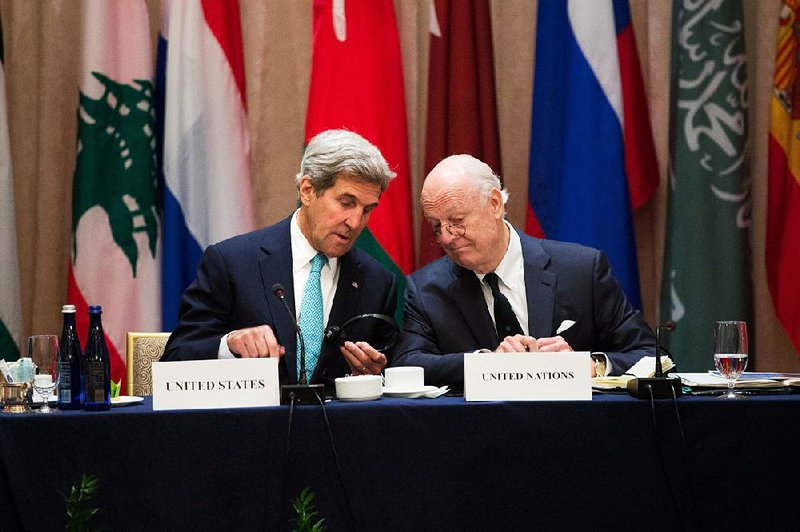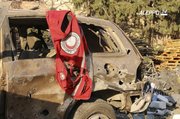BEIRUT -- The U.N. humanitarian aid agency suspended all convoys in Syria on Tuesday after an attack on aid trucks. The International Committee of the Red Cross said the attack killed about 20 civilians, mostly truck drivers and Red Crescent workers.
The attack pushed Syria's U.S.-Russia-brokered cease-fire further into doubt.
U.S. Secretary of State John Kerry and senior officials from two dozen nations meeting in New York on Tuesday declared that Syria's cease-fire "is not dead."
The Syrian military, just hours earlier, had declared that the weeklong truce had failed. The United States said it was prepared to extend the truce deal, and Russia -- after blaming rebels for the violations -- suggested it could still be salvaged.
Kerry held a brief, private meeting with Russian Foreign Minister Sergey Lavrov before both attended a larger gathering with foreign ministers from Europe and the region that are partners in the U.S.-led coalition, as well as Iran, which is supporting Syrian President Bashar Assad along with Russia. Lavrov left the group meeting without comment.
U.N. envoy Staffan de Mistura, who also attended the session, said afterward: "The cease-fire is in danger. The cease-fire has been seriously affected. But the only ones who can announce the cease-fire is dead are [the United States and Russia], and they have today not done so. They want to give it another chance."
French Foreign Minister Jean-Marc Ayrault told reporters after the meeting that "the U.S.-Russia negotiation has reached its limits" and that they "alone will not be able to achieve this cease-fire."
"What have we seen these last few hours?" Ayrault said. "Bombing is continuing. Aleppo is still threatened. The population is starving. And there is a humanitarian convoy that is attacked and there are dead. This is the reality. One must denounce this reality."
The group plans to meet again this week.
It was not clear who was behind the attack on the aid convoy, which occurred late Monday and sent a red fireball into the sky over a rural area in western Aleppo province. Both Syrian and Russian aircraft operate over the province, while the U.S.-led coalition targets the Islamic State extremist group in other parts of the country.
The deadly strike capped a rapid unraveling of week-old truce efforts brokered by the U.S. and Russia. The plan was intended to open routes to aid thousands of besieged Syrians and create conditions for a resumption of negotiations on a long-term political solution to Syria's civil war.
In Geneva, Jens Laerke, a spokesman for the U.N. Office for the Coordination of Humanitarian Affairs, said Tuesday that all aid deliveries had been halted pending a review of the security situation in Syria in the aftermath of the airstrikes. Laerke called it "a very, very dark day ... for humanitarians across the world."
A member of the Syrian Civil Defense -- a group of volunteer first responders also known as the White Helmets -- criticized the U.N. humanitarian aid agency for suspending the convoys.
Ibrahim Alhaj said Syrian civilians will pay the price for the decision -- and that the U.N. should have condemned the attacks on the convoy rather than suspending aid.
The Red Cross and the Syrian Red Crescent issued a statement Tuesday saying 20 civilians had been killed in the convoy attack, many of them struck while offloading aid from the trucks. Much of that aid had been destroyed, they said. Red Cross President Peter Maurer said the attack was a "flagrant violation of international humanitarian law" and "totally unacceptable."
Among the victims was Omar Barakat, who headed the Red Crescent in Uram al-Kubra, the town where the attack occurred, according to the Syrian Observatory for Human Rights, a Britain-based monitoring group, and Aleppo-based activist Bahaa al-Halaby.
The convoy was part of a routine interagency dispatch operated by the Syrian Red Crescent. U.N. officials said it was delivering assistance for 78,000 people in the town of Uram al-Kubra, west of the city of Aleppo. Initial estimates indicate about 18 of the 31 trucks in the convoy were hit, as well as the Red Crescent warehouse in the area.
World Health Organization spokesman Christian Lindmeier said the convoy was expected to carry medicine, emergency health kits, trauma kits, burn kits and IV fluids.
"All this was supposed to have been on that convoy, but I do not have a breakdown of what got destroyed and what did not get destroyed," he said.
When asked who was behind the airstrikes, Rami Abdurrahman of the Observatory said Assad's "regime does not have the capabilities to carry out such airstrikes within two hours."
He said the airstrikes on Aleppo province, including the ones that hit the convoy, were part of some 40 air raids that lasted about two hours -- starting about 7:30 p.m. Monday -- and that "it was mostly Russian warplanes who carried out the air raid."
Al-Halaby said rebels in Aleppo province also claimed Russian aircraft were behind the attack.
The Local Coordination Committees, another activist group in Syria, said Russia's air force and government warplanes dropped 25 bombs, damaging some 20 trucks and destroying the Red Crescent warehouse in Uram al-Kubra.
The White House said the U.S. holds Russia responsible for airstrikes by either Syria or Russia that hit the convoy. White House deputy national security adviser Ben Rhodes said all information indicates an airstrike hit the convoy. He said that, since the Syrian rebels lack an air force, either Syria or Russia conducted the strikes.
He said regardless of who carried out the strike, the U.S. considers Russia responsible because it was Russia's responsibility under the cease-fire deal to limit Syrian airstrikes.
The Syrian and Russian militaries both denied on Tuesday that they were involved in the attack.
"Neither Russian nor Syrian aviation conducted any airstrikes on the U.N. humanitarian convoy," said Maj. Gen. Igor Konashenkov, a Russian Defense Ministry spokesman, according to the Russian news agency Interfax. After reviewing available videos, he said, "everything we can see ... is a direct consequence of the fire on the cargo" that coincided with a ground offensive launched against government forces by militants.
U.N. Emergency Relief Coordinator Stephen O'Brien called on "all parties to the conflict, once again, to take all necessary measures to protect humanitarian actors, civilians, and civilian infrastructure as required by international humanitarian law."
In Moscow, a spokesman for Russian President Vladimir Putin described hopes for the resumption of the cease-fire as "weak." Conditions for resuming the truce, spokesman Dmitry Peskov said, were "quite simple: [The militants] must stop firing. The terrorists must stop attacking the armed forces of Syria."
Despite the attack, the U.N. appeared to move forward with aid airdrops in Syria.
World Food Program spokesman Bettina Luescher said in a statement that the U.N. food agency had airdropped aid to besieged neighborhoods in the eastern city of Deir el-Zour earlier Tuesday "as part of the planned schedule of deliveries."
Information for this article was contributed by Bassem Mroue, Jamey Keaten, Philip Issa and Jim Heintz and staff members of The Associated Press and by Karen DeYoung, Erin Cunningham, Zakaria Zakaria, Andrew Roth and Heba Habib of The Washington Post.
A Section on 09/21/2016



